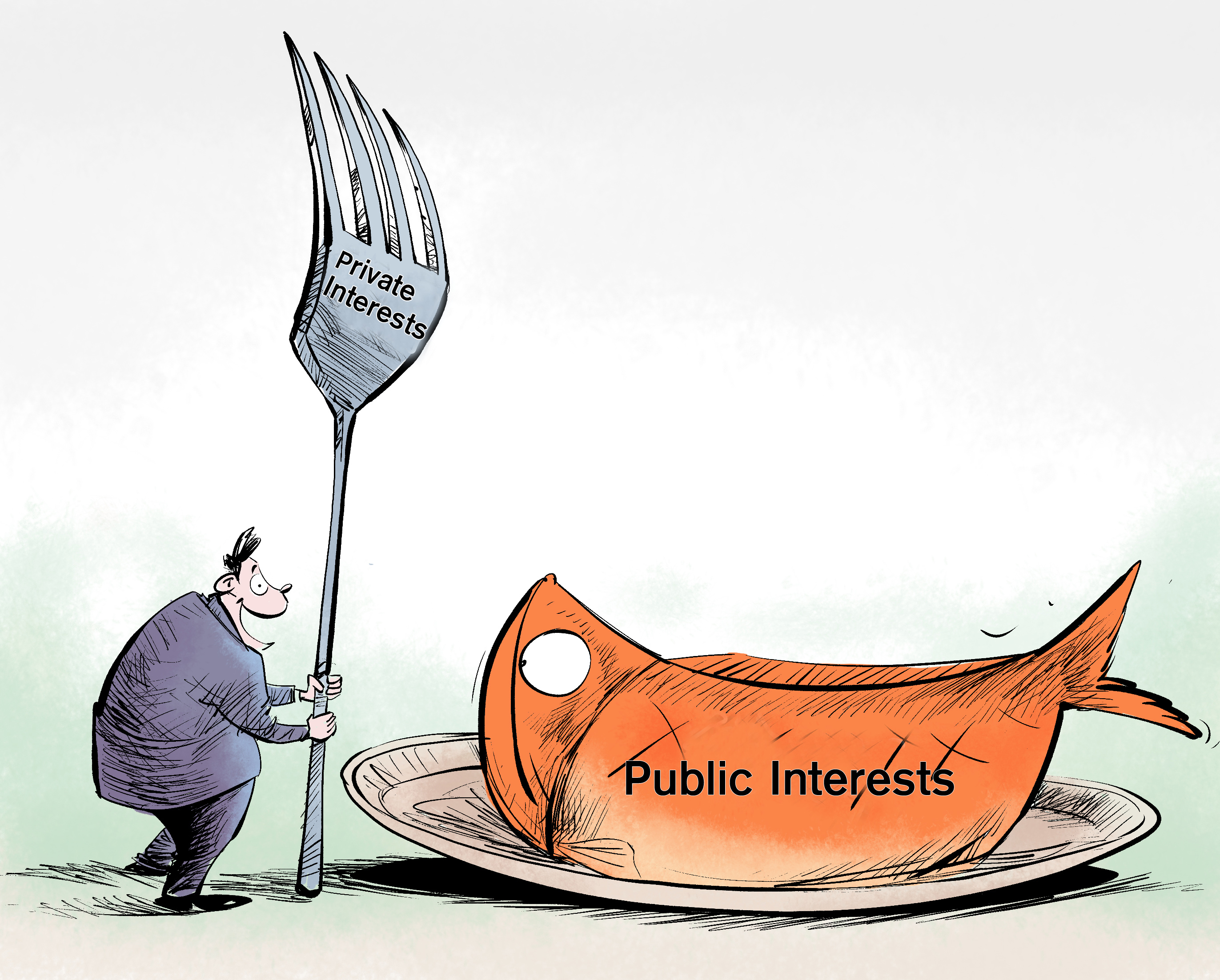XUAN CHAOQING: State governance must balance public and private interests

Don’t seek private gains
He catches sight of a big, fat fish/His hair stands up and eyes widened/Greedy with a large belly/He lunges a fork toward the fish/An appetite as insatiable/As his desire for private interest/A fish the size of a large boat/Swells selfish desires in his head/But laws will uphold justice/He languishes behind bars in deep remorse/ Don’t seek private gains/The government tightens the screws on graft!
(Cartoon by Gou Ben; Poem by Long Yuan)
Balancing public and private interests amid social transformation affects the rise and fall of a country. Effective management of relations between public and private interests will contribute to not only the institutional innovation of social governance, but also the promotion of state governance capacity.
Coordination between both sides
In Chinese history, there are some lessons worth learning in balancing public and private interests. During the Spring and Autumn and Warring States Periods (770-221 BC), nobles’ private interests surpassed public interests, resulting in social chaos and turmoil. This led to proposals to intensify propriety and law, and the formation of centralized states. All states also carried out long-term reforms. From the Qin to Han dynasties (221 BC-AD 220), the emergence of a unified empire led to national power grabbing social public interests and many subsequent peasant uprisings.
It is difficult to coordinate interest relations. The law usually regulates interest relations in our modern society. Abiding by the law is an organic part of the legal environment. Construction of values is crucial in the absence of rule of law. Regarding public and private interests, public values need to be established to coordinate interest conflicts and adjust people’s behavior patterns.
First, priority should be given to public interests. Socialist values emphasize that the people’s interests are above everything else. “Serving the people” is an important mantra of the Communist Party of China (CPC) and its priority of protecting public interests. Current problems such as corruption, food security and pollution are closely related to the deviation from socialist values and profiting at public expense.
Second, the principle of mutual benefit should be established for interest exchange. In an era when people strive to pursue wealth, there is an urgent need to protect the principle of fairness and mutual benefit for interest exchange and maintain the normal operation of the interest exchange mechanism. This is necessary at all levels, from resolving concrete social problems to giving full play to the fundamental role of markets.
Finally, public consciousness should be vigorously cultivated. Weak public consciousness will trigger many social problems. People should be clear about the boundary between public and private interests. Public consciousness should be carried forward and a sense of public spirit should be fostered in society.
Social governance resources
Exploration of social governance has a long history in China. Idealists in the Song Dynasty (960-1279) put forward proposals, such as restoring the patriarchal clan system and drinking etiquette, by turning to ancient traditional systems to safeguard local public orders, protect commoners from being exploited and carry out self-governance. They thought that the best form of local governance was cooperation that involved community members, which they considered beneficial to coordinating relations between public and private interests.
For social governance, importance should be attached to not only resources of traditional culture, but also the CPC’s rich experience in revolutionary practice. The CPC has carried out lots of theoretical discussion and practice in addressing relations between public and private interests. Mao Zedong (1893-1976), founder of the People’s Republic of China (PRC), once distinguished interests as personal, collective, social, and historical, among which the interests of the proletariat and the masses were made the top priority.
The CPC carried out abundant and lasting social service activities with the aim of wholeheartedly serving the people, setting a good example for dealing with the relations between public and private interests. For example, after the founding of the PRC, all levels of Party organizations and Party members enhanced their social service level and set up prestige among the masses through activities such as learning from Lei Feng (1940-62), a young Chinese soldier revered for selflessly helping the needy.
By learning from the ideas and tradition of the Communist Party, all members and cadres can effectively help the masses, heed their appeals and overcome their practical difficulties. Ways of social governance can be explored through such social services at a grass-roots level.
Xuan Chaoqing is a professor from the Department of Sociology at Nankai University.
